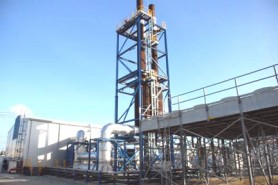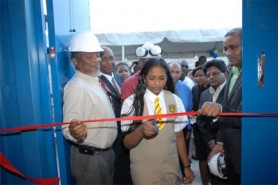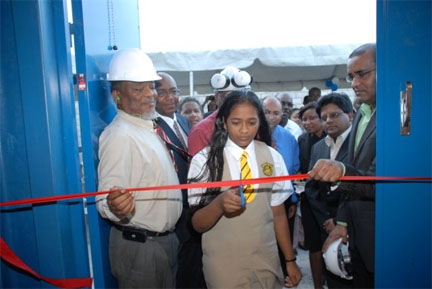Blackouts are not over yet for Guyanese even though the power company yesterday commissioned its new Kingston plant.
Its General Manager, Bharrat Dindyal, told consumers that outages for network maintenance will continue until the middle of this month.

He was speaking at the official commissioning of the US$27.5M Kingston power station. The new plant which adds 20.7 megawatts to the current generation capacity allows the Guyana Power and Light (GPL) to further reduce production costs and improve supply reliability. It has boosted the current capacity to 83 megawatts which will more than cover the Christmas demand which the company anticipates will reach as high as 78 megawatts, Dindyal stated.
Touching on some of the issues plaguing the company, he explained that two of the company’s engines came down for overhauls in quick succession and were scheduled to be finished by early November.
However due to the difficult October period in which blackouts were frequent the company offered to defer the maintenance of these engines to November. The process eventually started after November 5. He reported that one of these engines has since been overhauled and the second one is expected back in service next week.
Contributing to the company’s trials too was the fact that three of the new engines had some problems and replacement parts had to be sourced from overseas. As such only two of the engines have been working, with the third still currently down awaiting a part from Europe. However it is expected that this would be in operation before Christmas.

During a tour of the power plant in October, while most of the city was grappling with constant blackouts, GPL chairman Winston Brassington had said confidently that blackouts due to generating capacity would end with the commissioning of the new plant.
However at the official ceremony yesterday Brassington stated that while the generation situation is considerably better, “it is not as I said or expected.”
He acknowledged that over the last few months customers have been frustrated with the frequency and duration of blackouts which he said was due to the limited generation capacity, rising demand and works to facilitate the new transmission line. He further admitted that the company’s customer service was less than acceptable.
“There were many times that customers were not aware of what to expect and the reasons for our blackouts,” he told the gathering. However, he stated that though measures are underway to improve customer service, the company still has a far way to go to orient itself and focus on customer satisfaction.
Brassington pointed out that the company has been able to make much possible through a major government investment of over US$115M. He pointed out that over 2005 to 2008, government, through the Inter- American Development Bank, injected US$24M to allow the connection of over 35,000 households to the power grid. Last year, too, he said government provided an additional US$16M as a fuel subsidy when fuel prices reached record highs. He also highlighted the move by government early last year to absorb a 20% increase in tariffs to allow residential consumers to benefit from a lower tariff increase of between six and nine percent.
Prime Minister Samuel Hinds, who is minister with responsibility for the electricity sector, in brief remarks called on all to join the fight against electricity theft. He pointed out that while electricity usage is being looked at as a right, some felt that “it should be for the taking”. He pointed out that electricity theft has brought the company tremendous losses and urged that persons resist the practice and pay for the service.
President Bharrat Jagdeo in remarks noted that it has been very difficult for the company to juggle costs and still try to improve the power supply situation. He pointed too to the financial injections which had to be made to help the company cover fuel costs.
He explained that had the government not made this move it would have led to an increase in electricity tariffs since the company has suffered tremendous losses due to theft at the national level, thus eroding the revenue base of the company.
Partnership
Looking ahead, Jagdeo stated that it was his government’s intention to eventually have the power sector off its agenda via a partnership with the private sector.
He said that although the government did not want to remain with the sector, it had to because of the past issues. According to him, continued investment in the sector would eventually burden the Treasury and so a move to renewable energy was not a choice, but a necessity.
As such he said while government would maintain transmission and distribution, the other areas would have to be manned by an effective partnership.
“We will work with them along the way but we hope in the future this matter will basically come off cabinet’s agenda,” he said. Jagdeo told the gathering he shared the concerns of the population with regard to electricity supply and despite difficulties government has committed large sums towards improving the situation.
“We have had an atrocious situation and we need to improve along the way,” he admitted.
He told the gathering that the plant was due for a May commissioning but experienced delays.
Jagdeo alluded to his government’s plans to move forward with hydroelectricity, noting that this would have significant benefits and impacts on balance of payments and a reduction in the use of fossil fuels.
“We want a modern system that involves the private sector in a serious way,” he urged.
He noted the concerns which have been raised in different private sector circles with regard to the state of the electricity sector and its reliability, however he urged more appreciation from the sector for the significant efforts the state has been making in an attempt to keep tariffs stable while it works towards moving to more stable supply from renewable sources. (Heppilena Ferguson)

